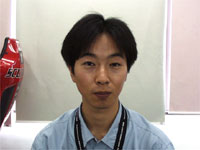Koki Koiwa
From Sega Retro

|
| Koki Koiwa |
|---|
| Place of birth: Ichinoseki, Iwate, Japan[1] |
| Employment history: Sega Enterprises (1992 – )
Divisions:
Divisions:
Divisions:
|
| Role(s): Programmer |
Koki Koiwa (小岩 功基) joined Sega in 1992 as an assistant programmer for Virtua Racing . He then became a programmer specializing in racing games, such as Daytona USA, Scud Race and Daytona USA 2: Battle on the Edge, culminating in being the assistant director of both the twin and Dreamcast versions of F355 Challenge.[2] Outside of the racing genre, he was a regular developer on the Virtua Fighter series, mainly being a part of the VF.NET team.
Contents
Early life
Koki Koiwa was born in Ichinose, a rural city filled with rice paddies. What he calls his "earliest racing game experience" was to use empty juice cans and float them down an irrigation channel in competition with each other. As the cans would slowly fill up with water, they would have to be periodically scooped up and emptied before returning to the race. These actions were dubbed "Pit Ins".[1]
He also played outdoor games in elementary school, mainly baseball. While he enjoyed the sport, he wasn't a good player, so was typically stuck playing positions other players weren't interested in, which was most often the catcher. By contrast, he was far ahead of his classmates when it came to knowledge of popular music, as his older brothers of 16 years exposed to musicians such as The Beatles. One of the artists that most influenced him at this time was Yellow Magic Orchestra with their techno sound.[1]
With the rise of home consoles, most of his peers purchased a Famicom, but Koiwa instead got an SC-3000 so he could also learn to program music with a computer, inspired by YMO. This transitioned into a love of video game music, coinciding with the rising popularity of the S.S.T.Band. He also often bought issues of the magazine Beep, most looking forward to its included Sono Sheets, his favourite being Sega Game Music for featuring songs from Fantasy Zone. This sparked in him the idea of becoming a game developer.[1]
During his high school years, Koiwa often visited an arcade inside a bowling alley, but as he didn't have a lot of money, he spent most of the time watching other people play, studying their actions so he could aim for high scores even with only 1 or 2 plays. His favourite game was Xevious. Despite this, frequenting the arcade was banned at his school and he was caught by his teachers twice, scaring him away with harsh punishments.[1]
His dream of becoming a game developer lay dormant until after he completed his university entrance exams, but at university he was able to study game development within the Department of Information Engineering. His time at university was mainly split between studying, random co-op activies and going to arcades, which were just beginning to offer OutRun, designed by his future boss Yu Suzuki.[1]
Production history
Games
- Virtua Racing (Model 1; 1992) — And Our Fresh Staffs (as Kohki Koiwa)
- Daytona USA (Model 2; 1994) — Programmers (as Kouki Koiwa)
- Virtua Fighter 3 (Model 3; 1996) — Sound, I/O Utility
- Scud Race (Model 3; 1996) — Programmers (as Kouki Koiwa)
- Scud Race Plus (Model 3; 1997) — Programmers (as Kouki Koiwa)
- Virtua Fighter 3tb (Model 3; 1997) — Sound, I/O Utility
- Daytona USA 2: Battle on the Edge (Model 3; 1998) — Enemy Car Program
- Daytona USA 2: Battle on the Edge (Model 3; 1998) — Sound & Cabinet Control Program
- Virtua Fighter 3tb (Dreamcast; 1998) — Sound, I/O Utility
- Daytona USA 2: Power Edition (Model 3; 1998) — Enemy Car Program
- Daytona USA 2: Power Edition (Model 3; 1998) — Sound & Cabinet Control Program
- F355 Challenge (NAOMI Multiboard; 1999) — Assistant Director
- F355 Challenge (Dreamcast; 2000) — Assistant Director
- F355 Challenge 2: International Course Edition (NAOMI Multiboard; 2001) — Assistant Director
- Virtua Fighter 4 (NAOMI 2; 2001) — VF.NET team
- Virtua Fighter 4 (PlayStation 2; 2002) — Special Thanks[3] (as 小岩 功基)
- Virtua Fighter 4 Evolution (NAOMI 2; 2002) — VF.NET Team
- F355 Challenge (PlayStation 2; 2002) — Special Thanks[4]
- Virtua Fighter 4 Evolution (PlayStation 2; 2003) — Special Thanks[5]
- Virtua Fighter 5 (Lindbergh; 2005) — VF.NET Team
- Virtua Fighter 5 R (Lindbergh; 2008) — VF.NET team
- Virtua Fighter 5: Final Showdown (Lindbergh; 2010) — VF.NET team
- Virtua Fighter 5: Final Showdown (Xbox 360; 2012) — VF.NET team
- Virtua Fighter 5: Final Showdown (PlayStation 3; 2012) — VF.NET team
- StarBoat Progress (RingEdge; 2013) — STARBOAT.NET COODINATORS
- Hatsune Miku: Project DIVA Arcade Future Tone (Nu; 2013) — DIVA.NET
- Hatsune Miku: Project DIVA Arcade Future Tone (PlayStation 4; 2016) — DIVA.NET
- WCCF Footista 2019 (ALLS UX; 2019) — プログラマー[6] (as 小岩 功基)
Videos
- Sega Amusement CG World Best Collection (LaserDisc; 1995) — Programmers (as Kohki Koiwa)
Music
- Daytona USA 2 Sound Tracks (CD; 1998) — Programming Team
Magazine articles
- Main article: Koki Koiwa/Magazine articles.
Interviews
External links
References
- ↑ Jump up to: 1.0 1.1 1.2 1.3 1.4 1.5 Dreamcast Magazine, "2000-25 (2000-07-28)" (JP; 2000-07-14), page 86
- ↑ http://www.sega-rd2.com/week/2000_08/vol034.html#01 (Wayback Machine: 2002-06-25 02:51)
- ↑ File:VirtuaFighter4_PS2_JP_SSCredits.pdf
- ↑ File:F355Challenge_PS2_JP_SSCredits.pdf
- ↑ File:VirtuaFighter4Evolution_PS2_JP_SSCredits.pdf
- ↑ File:WCCFFootista2019 credits.pdf